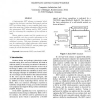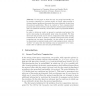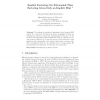290 search results - page 18 / 58 » Pseudorandom Bits for Polynomials |
ITC
1997
IEEE
14 years 1 months ago
1997
IEEE
A deterministic BIST scheme is presented which requires less hardware overhead than pseudo-random BIST but obtains better or even complete fault coverage at the same time. It take...
DCC
2008
IEEE
14 years 9 months ago
2008
IEEE
There are two main classes of decoding algorithms for "compressed sensing," those which run time time polynomial in the signal length and those which use sublinear resou...
CRYPTO
2001
Springer
14 years 2 months ago
2001
Springer
In this paper we show that any two-party functionality can be securely computed in a constant number of rounds, where security is obtained against malicious adversaries that may ar...
FSE
2011
Springer
13 years 1 months ago
2011
Springer
Hamsi is one of the 14 second-stage candidates in NIST’s SHA-3 competition. The only previous attack on this hash function was a very marginal attack on its 256-bit version publi...
PKC
2009
Springer
14 years 10 months ago
2009
Springer
We address the problem of polynomial time factoring RSA moduli N1 = p1q1 with the help of an oracle. As opposed to other approaches that require an oracle that explicitly outputs b...



